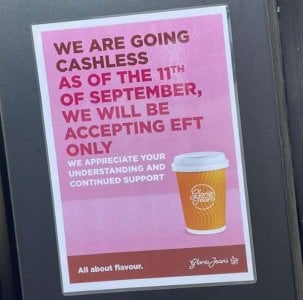Palpitating with anger: Customers express disappointment as famous coffee chain goes cashless
By
Danielle F.
- Replies 70
In an increasingly digital age, a large chunk of customers still prefer the jingle of coins and the rustle of banknotes.
A retailer's recent decision sparked a heated debate among Aussie coffee lovers.
Australian coffee chain Gloria Jean's has decided to go cashless by 11 September and will no longer accept cash in stores.
A Gloria Jean's customer spotted the restaurant's announcement through a signage in one of the stores.
The customer shared the find on a local community group and met with a wave of discontent.
'It looks like they will also be going customerless,' one customer stated.
'Not getting my business. What happens when the internet goes down?' another customer asked.
'I'll not get coffee there. There are plenty of places that still take cash. Sick of all the added surcharges added to each transaction,' a third shared.
A spokeswoman from Retail Food Group, Gloria Jean's franchise owner, explained that this decision could enhance safety and streamline operations.
Yet, the franchise partners who own the majority of Gloria Jean's outlets still retain the autonomy to decide their cash-handling policies.
This backlash raised important questions about the state of cash transactions in Australia.
According to the Australian Competition and Consumer Commission (ACCC), while businesses are not obligated to accept cash, they must include any surcharges in the displayed prices if there are no cash payment options available.
Dr Angel Zhong, an associate finance professor at RMIT, noted that Australia was a global leader in adopting digital payments, surpassing the United States and Europe.
'We are also the birthplace of large-scale, buy-now-pay-later services such as Zip and Afterpay,' Dr Zhong added.
The use of digital wallet payments on smartphones and watches also skyrocketed from $746 million in 2018 to over $93 billion in 2022.
According to The Reserve Bank of Australia's data, the COVID-19 pandemic accelerated the decline in cash use.
Around 13 per cent of payments were made in cash in 2022—a stark contrast to the 70 per cent usage rate in 2007.
Despite this trend, research from payments technology company Waave found that seven out of ten Aussies are concerned about the disappearance of cash, with two out of five respondents being extremely concerned about banknotes becoming a relic.
Dr Zhong also predicted that Australia will be 'functionally' cashless by 2030, with over 90 per cent of payments done through digital platforms.
However, this prediction continues to worry those who still prefer cash transactions—including the elderly, people in rural areas with unreliable internet access, and those who prefer tangible cash transactions.

What do you think about Gloria Jean's move to cashless payments? Have you felt the push towards digital payments in your daily transactions? Share your insights and opinions with us in the comments section below.
A retailer's recent decision sparked a heated debate among Aussie coffee lovers.
Australian coffee chain Gloria Jean's has decided to go cashless by 11 September and will no longer accept cash in stores.
A Gloria Jean's customer spotted the restaurant's announcement through a signage in one of the stores.
The customer shared the find on a local community group and met with a wave of discontent.
'It looks like they will also be going customerless,' one customer stated.
'Not getting my business. What happens when the internet goes down?' another customer asked.
'I'll not get coffee there. There are plenty of places that still take cash. Sick of all the added surcharges added to each transaction,' a third shared.
A spokeswoman from Retail Food Group, Gloria Jean's franchise owner, explained that this decision could enhance safety and streamline operations.
Yet, the franchise partners who own the majority of Gloria Jean's outlets still retain the autonomy to decide their cash-handling policies.
This backlash raised important questions about the state of cash transactions in Australia.
According to the Australian Competition and Consumer Commission (ACCC), while businesses are not obligated to accept cash, they must include any surcharges in the displayed prices if there are no cash payment options available.
Dr Angel Zhong, an associate finance professor at RMIT, noted that Australia was a global leader in adopting digital payments, surpassing the United States and Europe.
'We are also the birthplace of large-scale, buy-now-pay-later services such as Zip and Afterpay,' Dr Zhong added.
The use of digital wallet payments on smartphones and watches also skyrocketed from $746 million in 2018 to over $93 billion in 2022.
According to The Reserve Bank of Australia's data, the COVID-19 pandemic accelerated the decline in cash use.
Around 13 per cent of payments were made in cash in 2022—a stark contrast to the 70 per cent usage rate in 2007.
Despite this trend, research from payments technology company Waave found that seven out of ten Aussies are concerned about the disappearance of cash, with two out of five respondents being extremely concerned about banknotes becoming a relic.
Dr Zhong also predicted that Australia will be 'functionally' cashless by 2030, with over 90 per cent of payments done through digital platforms.
However, this prediction continues to worry those who still prefer cash transactions—including the elderly, people in rural areas with unreliable internet access, and those who prefer tangible cash transactions.
Key Takeaways
- Gloria Jean's, a popular café chain in Australia, announced its transition to cashless transactions by 11 September.
- The change aimed to create a more efficient, safer working environment for staff but has been met with customer backlash.
- The Australian Competition and Consumer Commission emphasised that businesses do not have to accept cash, but displayed prices must always include any surcharges.
- Australia has experienced a sharp decline in cash use, with predictions of becoming a 'functionally' cashless society by 2030. However, Australians shared their concerns over privacy, security risks, and technology dependence.








